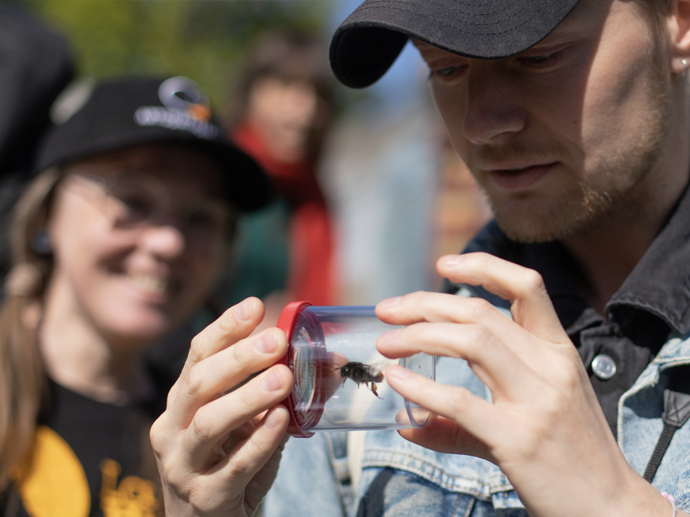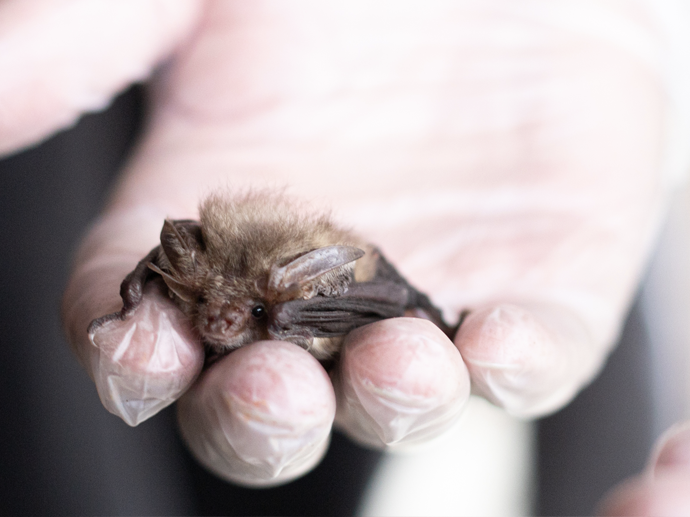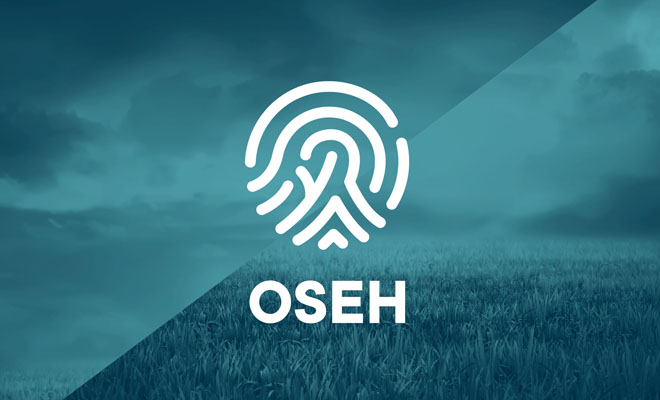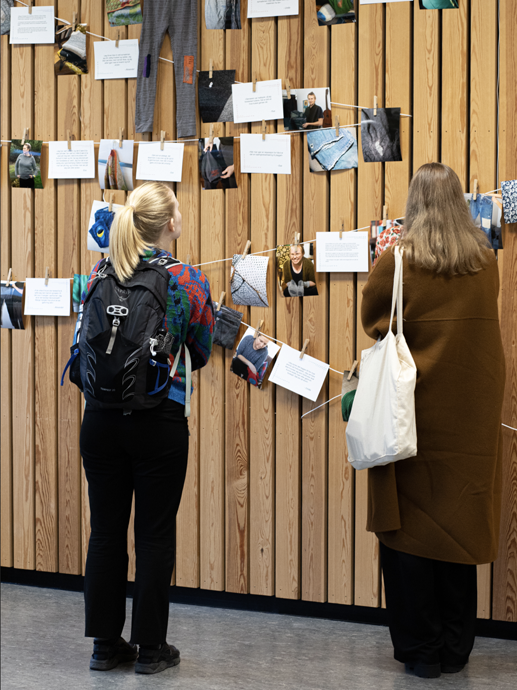Events
In 2022, OSEH hosted a series of varied events in line with our aims and visions. Below we’ve gathered some of the highlights from the year – a comprehensive list of events and more details can be found on our webpage under News and Events.
Environmental Lunchtime Discussions (ELD)
OSEH’s Environmental Lunchtime Discussions (ELDs) have been collaboratively organized by the members of the OSEH working group to guarantee a great diversity of topics from various disciplines, and beyond academia. In 2022 we had 17 ELDs and celebrated our Environmental Lunchtime Discussions with the 100th ELD given by Ada Arendt on “Homo curans. Early Anthropocenic agencies of care” . The ELDs continued to be popular events also in 2022, with lectures spanning a number of different topics, from phenology to Humanoid Oceans to environmental equity in schools in the US. We continued to do the ELDs digitally in 2022, to allow for participation also from the international community.
Environmental Humanities Lecture Series:
OSEH hosted a total of six Environmental Humanities Lectures in 2022, featuring a variety of topics from leading scholars in the field:
Organized by OSEH:
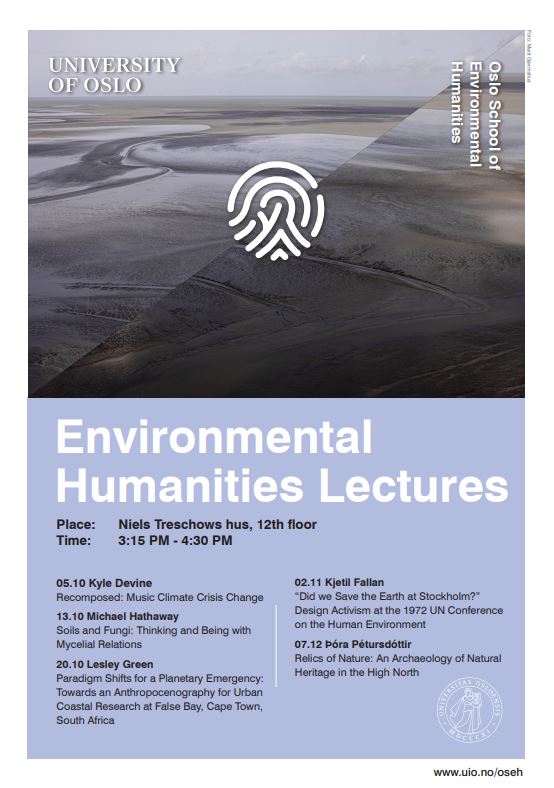
- The Virosphere: Learning to Live With the Unknown, by Associate Professor Eben Kirksey
- Recomposed: Music Climate Crisis Change, by Professor Kyle Devine
- Soils and Fungi: Thinking and Being with Mycelial Relations, by Professor Michael J. Hathaway
- Paradigm Shifts for a Planetary Emergency: Towards an Anthropocenography for urban coastal research at False Bay, Cape Town, South Africa, by Professor Lesley Green
- "Did we Save the Earth at Stockholm?" Design Activism at the 1972 UN Conference on the Human Environment, by Professor Kjetil Fallan
Organized as part of the OSEH Collaboratory “Critical Petroaesthetics”:
- Perpetual renewal: the fiction of decommissioning, by Professor Graeme Macdonald.
Welcome to the Anthropocene Lecture Series:
In 2022, OSEH continued organizing the interdisciplinary lecture series “Welcome to the Anthropocene” as an event both open to the public, and at the same time an integral part of our Honours Certificate Environmental Humanities and Sciences (EHS) EHS4010. We held the Anthropocene lectures via Zoom as a consequence of the Covid pandemic, and also to enable international attendance, and later published the lectures as open-access talks on our website. The lecture series featured four leading international scholars exploring how their disciplines are responding to both the concept of the Anthropocene, and to the planetary crisis that is designates:
• Intimate Inheritance: Plastic and Its Relations, by Assistant Professor Heather Davies
• Ironies of the Anthropocene, by Professor Marcia Bjornerud
• Anthropocene Patches: Space, Time and Position, by Professor Anna Tsing
• A Cosmopolitical Challenge: Activating uBuntu in Partnerships between Environmental Management Sciences and the Humanities, by Professor Lesley green
The lecture series will continue in 2023, and the full program can be found here.
PhD Researcher School on “Situated Research – Exploring Place and Time” and Environmental Humanities Festival
In June, with co-funding from the Norwegian Researcher School in Environmental Humanities (NoRS-EH) , we hosted a four-day PhD Researcher School on “Theories and Methods in the Environmental Humanities”. The week started with the public evening event “Reclaiming Sustainability? – A Conversation on Education and our Environmental Futures” with Tim Ingold (University of Aberdeen), Mette Halskov Hansen (UiO), Britt Kramvig (UiT), Felix Riede (Aarhus University), Heather Swanson (Aarhus University), and Gro Birgit Birgit Ween (Museum of Cultural History, UiO). Close to 150 attended the event in person at Kulturhuset in downtown Oslo. The following two days, 23 PhD students participated in the PhD Research Seminar on “Situated Research – Exploring Place and Time Through the Environmental Humanities”, in the beautiful Oslo’s beautiful Botanical gardens. The research seminar had place-based teaching and writing exercises led by an exciting group of scholars.
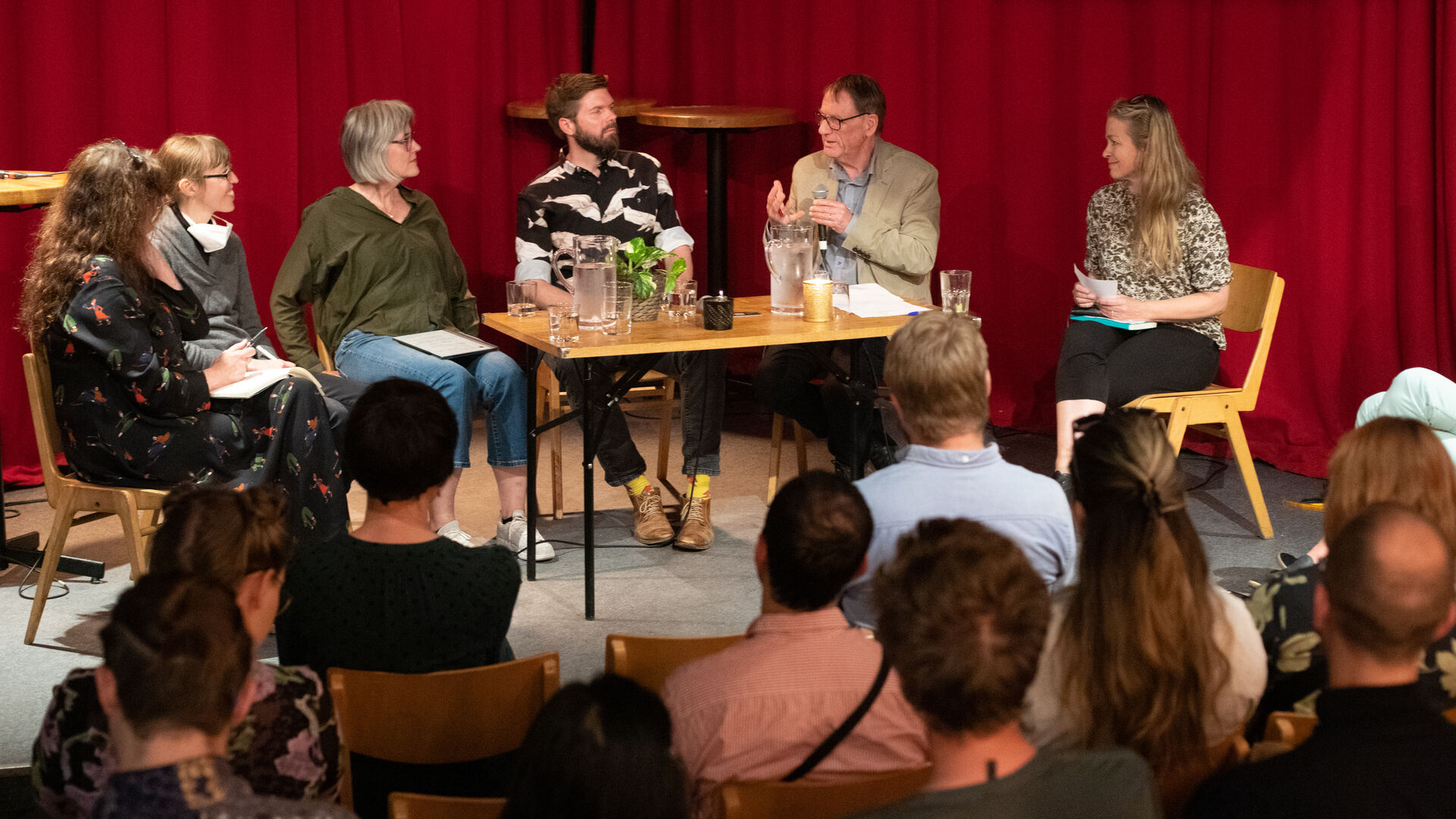
As the closing event of the week, we invited colleagues, students and the public to join our Environmental Humanities festival, where we celebrated the exciting work happening in the field here at UiO, in Norway, and beyond. The festival included a keynote lecture by Jamie Lorimer, presentations by OSEH’s collaboratories, a pop-up exhibition of projects from last year’s EHS students, a music performance, and more.
Walkshop – Unruly Renegades & Forest & Fungi Workshop
To encourage cross-disciplinary thinking and place-based research, in fall 2022, we organized a walkshop and forest foray with natural historian and environmental photographer Alison Pouliot, takes us deep into the Oslo marka to discover its diversity, explore ideas and rethink fungus-forest lives.
Eco-Slam
Since the beginning of OSEH, our aim has been to closely integrate students into environmental research activities. At our yearly “Eco-Slam” in December, EHS students showcased their creative final research projects developed in the course EHS4000 – Knowing Natures: Environmental Research Seminar where they experiment with interdisciplinary methods and develop creative and arts-driven forms of research dissemination. Like in the previous year, we were impressed by the creativity and varied set of innovative projects. The Eco-slam was open to the public, and included projects presenting film screenings, storytelling, drawings, poetry, sound installations, photography exhibitions, and more.
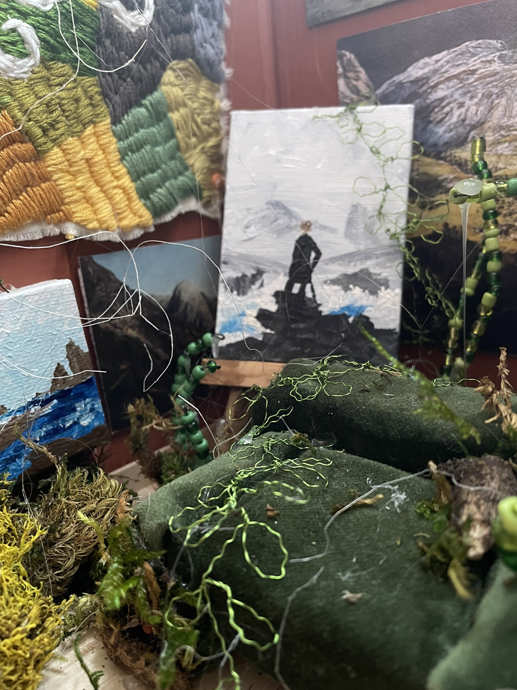
Research
Research at OSEH covers a wide span of disciplines. In 2022, we hosted the following OSEH collaboratories:
• Anthropogenic Soils (PIs: Ursula Münster and Daniel Münster, IKOS)
• Bionic Natures (PIs: Hugo Reinert and Rachel Douglas-Jones, IKOS)
• Critical Petroaesthetics (PI: Sissel Furuseth, ILN)
• Fluid Dynamics Marine Communities, Territory Work, and Ecosystem Change in Anthropic Oceans (PI: Florence Durney, IKOS)
• Media Seas of the High North Atlantic (PI: Liv Hausken, IMK)
• Monsters of the Anthropocene (PI: Rebecca Scherr, ILOS)
• Playing with Deep Time (PI: Laura op de Beke, IKOS)
• Restorations Mending Heritage Landscapes and Biodiversity (PIs: Ane Ohrvik and Karen Lykke Syse, IKOS)
• Worlds of Meaning in Conservation (PIs: Sara Asu Schroer and Thomas Van Dooren, IKOS)
This year, Laura op de Beke, finished her collaboratory Playing with Deep Time, but although the Collaboratory is finished it continues to have an impact. In the fall of 2022, “Long Story: a deep time LARP” was nominated for IndieCade’s (Independent Festival of Independent Games) Live Action Award.
2022 also marked the start for two research groups affiliated with OSEH: EcoLit: Ecocritical Literary and Cultural Studies (with OSEH working group member Michael Lundblad as the head of the research group), and KLIMER: Climate, environment and energy (with OSEH working group member Dominik Collet as one of the two heads of the group).
Anthropogenic Soils:
Springing from the OSEH Collaboratory “Anthropogenic Soils”, the multidisciplinary RCN Fellesløft project “Anthropogenic Soils” started up in the fall of 2022 with a lecture by Libby Robin, “Growing the Environment out of the Soil”. The project “Anthropogenic Soils” is led by OSEH’s Director Ursula Münster, and studies the ways people in different parts of the world have invented, practiced, and imagined ways of recuperating soil health.
Visiting scholars:
We were very excited to welcome four visiting scholars to OSEH in 2022. In the spring, two PhD students joined OSEH: Oscar Hartman Davies (University of Oxford) and Lena Pfeifer (University of Würtzburg). Besides working on their PhD projects, the two also engaged with other researchers, exchanged ideas and attended workshops and seminars.
In June, Anselmo Matusse visited OSEH through the INTPART project Strengthening Environmental Anthropology Research and Education Through Interdisciplinary Methods and Collaborations, and in August, Libby Robin visited OSEH to hold the inaugural lecture for Anthropogenic Soils, in addition to participating at a workshop and engaging with other researchers.
Teaching:
We were excited to welcome 27 students from 20 different Master’s programmes to the second year of teaching in the Honours Certificate in Environmental Humanities and Sciences (EHS).
For the course EHS4010 – Welcome to the Anthropocene: Interdisciplinary Lecture Series, we had four leading international scholars exploring how their disciplines are responding to both the concept of the Anthropocene, and to the planetary crisis that is designates. See above under “Events“ for more on the lecture series.
The mandatory course EHS4000 – Knowing Natures: Environmental Research Seminar runs over two semesters. In the spring semester, we conducted several place-based excursions, to the Botanical Gardens, the Akerselva river, the Huken quarry, and a bat-house. The students’ final projects for the course were presented at an Eco-slam in December (see more under “Events” above).
